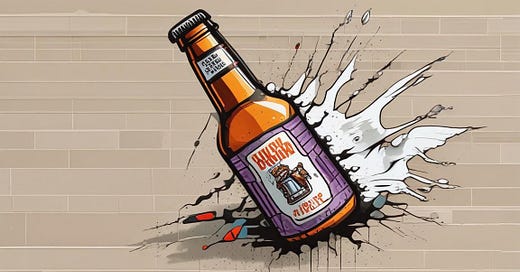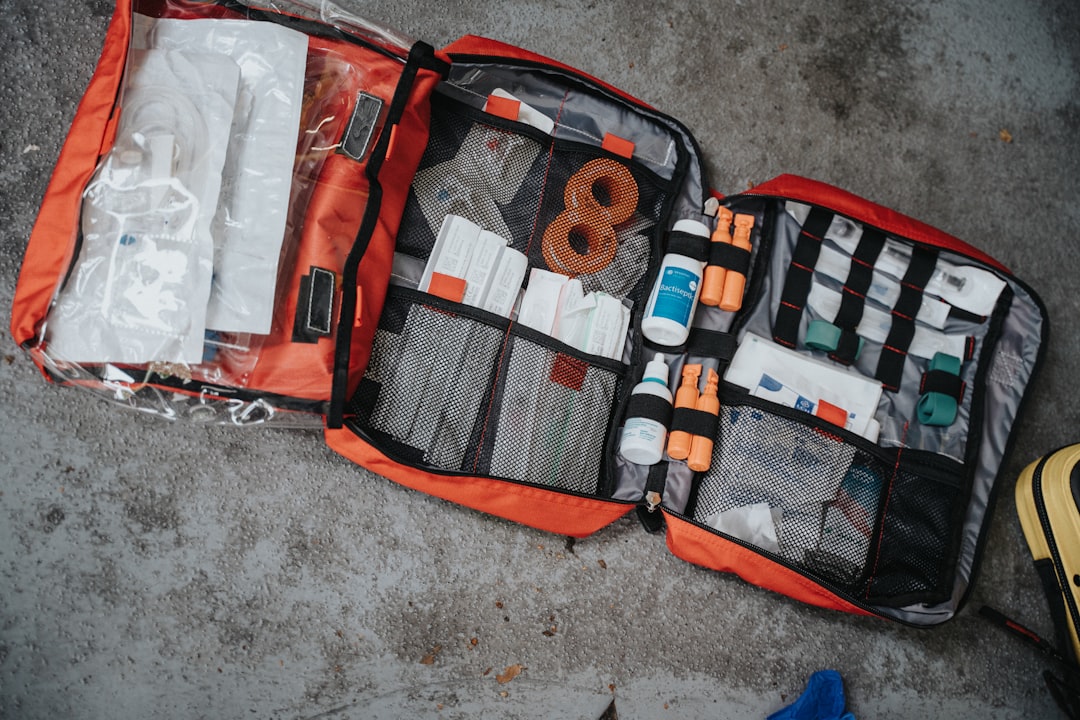Break Free: 9 Essential Steps to Help You Cut Out Alcohol
Ways to change your drinking habits and regain control over your life
Welcome to the AFFathers newsletter on Substack.
I'm often asked for advice on quitting heavy drinking, (and sometimes about just cutting down). While my experiences and guidance are scattered across multiple articles, today I've compiled a concise guide to help you navigate this journey.
As you embark on reclaiming control over your life and reducing alcohol consumption, it's crucial to have a clear plan in place.
Here are 9 essential steps to help you break free from booze and overcome drinking habits:
1. Embrace physical exercise and quality sleep
Making it to bed without alcohol may seem daunting, but you’re more than capable of doing it. However, it is important to structure a routine to achieve this.
This should start with being active during your day. The things you do leading up to bedtime will make a huge difference and regular physical exercise will play a positive part in staying away from booze.
Exercise offers numerous benefits for both physical and mental health, including reduced stress, improved mood and better sleep quality - more on that below. Find activities that you enjoy and incorporate them into your daily routine.
Here are some suggestions:
Walking
Jogging
Cycling
Yoga
Dancing
Swimming
Tennis
Football
Lifting weights
Aim for at least 30 minutes of moderate-intensity exercise most days of the week. This way you will hopefully tire yourself out before bed, which will aid in the sleeping process.
Remember, the goal is to make it to bed without having a drink so physically exerting yourself during the day will help.
If you need a fitness plan, my friend Jack has just the one for you. Try the 90-Day Warrior Monk Transformation program today!
I found that in early sobriety my weakest moments usually came when I had been lazy during the day, when I was overtired or emotionally drained. However, when I was active during the day, I was able to make it to bed with little to no cravings for the liquid poison.
As I’ve alluded to previously, my personal experience is that you need plenty of sleep during the early days of sobriety and I utilised naps to help achieve that. You gain more mental clarity over your drinking habits when you’ve slept well.
Breaking down your evening routine into manageable steps and introducing more structure will help going to bed sober more attainable.
Engage in activities that distract you from the urge to drink as well as doing things that aid in getting good sleep:
Read
Take a warm bath
Practise relaxation techniques like deep breathing or meditation
Avoid alcohol triggers - more on this later
Avoid caffeine and electronic devices before bedtime
Don’t have alcohol in the house
Create a calm and comfortable sleep environment
Ensure your bedroom is dark, quiet and at a comfortable temperature
Establish a consistent sleep schedule
By making this a consistent routine, you reinforce your commitment to sobriety - more on this later too - and help yourself achieve a peaceful night's sleep without alcohol.
2. Attend an AA meeting to seek support and guidance
Attending Alcoholics Anonymous (AA) meetings can provide invaluable support and guidance as you navigate your journey toward sobriety.
When I attended my first AA meeting and was surrounded by people who understood what I was going through, I knew that I wasn't alone anymore. It was such a relief. And although I haven’t been in many years, I will always recommend it to people.
If you’re attending a meeting for the first time, it's normal to feel nervous or even a little apprehensive but remember that everyone there has been in your shoes and understands what you're going through.
Take the opportunity to listen to other's experiences - listen for the similarities, not the differences - and share your own if you feel comfortable. Remember that you're not alone, there's strength in community and shared struggles.
After the meeting, consider staying for post-meeting interactions over coffee or tea, as this can provide additional support and connection with others on a similar path.
3. Reflect on past negative drinking experiences
Take time to reflect on your past experiences with alcohol, particularly those that were negative or harmful. I always picture one of my last ‘drunks’. It is etched in my mind to scare myself if I ever think about drinking again.
A good practice, or so I’ve found, is to consider the physical, emotional, and social consequences of your drinking behaviour, including hangover symptoms, impaired judgment, strained relationships, and missed opportunities.
Journaling can be a helpful tool for processing your thoughts and emotions and gaining clarity on your motivations for wanting to change your drinking habits.
Journaling can also provide “the introspection you need to dive deep inside yourself and find out what you want, what you are,” as
wrote in his article, My New Journaling Method.By acknowledging the negative impact of alcohol on your life, you can strengthen your resolve to make positive changes and pursue a healthier, more fulfilling lifestyle.
4. Identify and avoid triggers for drinking
Understanding your triggers for drinking can empower you to make proactive choices and avoid situations that may tempt you to drink.
For instance, you might turn to alcohol as a way to unwind after a stressful day, a way to cope with anger after an argument with your spouse or suppress the worries of financial trouble. Knowing when you would typically drink is so important.
It’s good practice to reflect on the people, places, activities, and emotions that tend to precede your drinking episodes and develop strategies for managing these triggers effectively.
This is where it becomes vital to develop healthier alternatives to booze.
You may need to set boundaries with friends or family members who encourage or enable your drinking. You may also need to find alternative social activities that don't revolve around alcohol, or practise relaxation techniques to cope with stress and cravings.
By identifying and addressing your triggers, you can minimise the risk of relapse and maintain your commitment to sobriety.
A MUST READ:
5. Connect with individuals who have overcome similar challenges
As I identified earlier, seeking support from others who have walked a similar path can provide encouragement, inspiration, and practical advice as you work towards your goals. But it’s not just AA, there are similar, and different, recovery programs too.
Online communities, support groups and peer-led recovery programs offer opportunities to connect with like-minded individuals who understand your struggles and can offer empathy, validation, and guidance.
Join the AFFathers Community - a supportive place for dads in early/long-term recovery from alcohol addiction who are looking to form connections with other sober dads, tackle parenting issues and navigate the ups & downs of life as a dad living without alcohol.
Take advantage of these resources to share your experiences, ask questions, and learn from others' successes and setbacks. Remember that recovery is a journey and having a supportive network can make all the difference in your success.
** Check out the SoberStack resource put together by **
6. Practice mindfulness and stress management techniques
Mindfulness practices, such as meditation, deep breathing exercises, and progressive muscle relaxation, can help cultivate present-moment awareness and reduce stress, anxiety, and impulsivity—all of which can contribute to alcohol misuse.
Some people utilise prayer, while others go for a walk in nature. Whatever way you choose to practice mindfulness, incorporate it into your daily routine. By doing so, you promote emotional regulation, self-awareness, and inner peace.
On top of mindfulness practises you should explore other stress management techniques, such as journaling, engaging in creative activities or practising gratitude. These types of practices are great for alleviating stress and promoting overall well-being.
notes that author Steve Biddulph urges us to notice what we are smelling right now and the sounds we are hearing around us. He mentions that “this simple ‘Stop and Do’ practice can bring you back to your body, right here and now.”7. Seek professional help if needed
If you find that you're struggling to manage your alcohol consumption on your own, don't hesitate to seek professional help. This might sound obvious or even, scary. But you mustn’t shy away from it because this sort of intervention could stop you from experiencing further pain or save your life.
A licensed therapist, counsellor, or addiction specialist can provide personalised guidance, support, and evidence-based treatment options tailored to your specific needs.
Therapy can help you explore the underlying causes of your drinking, develop coping strategies for managing cravings and triggers, and learn healthier ways of coping with stress and negative emotions.
Remember that asking for help is a sign of strength, not weakness, and taking proactive steps to address your alcohol use can lead to positive outcomes and lasting change.
8. Celebrate your progress and milestones
Acknowledge your progress in sobriety and celebrate milestones. This reinforces your commitment and will remind you of your progress. It will provide motivation and momentum to stay the course.
Take time to recognise and celebrate each milestone, whether it's a day, a week, a month, or a year of sobriety. Although, it is important not to get cocky or take your eye off the prize. You are not doing this to reward yourself afterwards.
This is a continued effort towards a better life, that’s the reward. A new life free from the shackles of addiction.
Share your successes with supportive friends, family members, or peers who can cheer you on and provide encouragement.
Remember that every step forward is a victory worth celebrating.
9. Create a long-term plan for maintaining sobriety
As you continue on your journey to sobriety, it's important to develop a long-term plan for maintaining your progress and preventing relapse.
This may involve ongoing therapy or counselling, participation in support groups or recovery meetings, regular self-care practices, and healthy lifestyle habits.
This should also involve community. It’s so important in sobriety. As
noted in one of his recent articles, community had become a major, positive part of his life.He said: “My full community life of my neighbours, my special Texas town of Wimberley, my friends, my radio station peeps, my volunteering and Board roles—all bring me the community I require to be healthy and functional today.”
Aside from community, you must identify potential challenges or obstacles that may arise along the way and brainstorm strategies for overcoming them.
Stay connected to your support network, stay vigilant about your triggers, and stay committed to prioritising your health and well-being.
By staying proactive and focused on your long-term goals, you can build a fulfilling life free from the grip of alcohol addiction.
Thank you for reading: “Break Free: 9 Essential Steps to Help You Cut Out Alcohol.”
If you enjoyed this article and would like to support me, you can become a paid subscriber. If you’re unable to do this, I’d be very grateful if you’d ‘buy me a coffee’. I’m a stay-at-home dad and every little helps :)
Check out the last post: “Escape the Darkness and Fight for a Fulfilling Life.”
Take care of yourself and your family,
Roscoe | @AFFathers
Please follow AFFathers on Telegram, Twitter/X, Instagram and Bluesky.







Thanks for mentioning SoberStack and offering these tips, Roscoe!
“Mike Mather notes that author Steve Biddulph urges us to notice what we are smelling right now and the sounds we are hearing around us. He mentions that this simple ‘Stop and Do’ practice can bring you back to your body, right here and now.”
Steve Biddulph has a couple of great books to sink your teeth into.
Thanks, Roscoe.